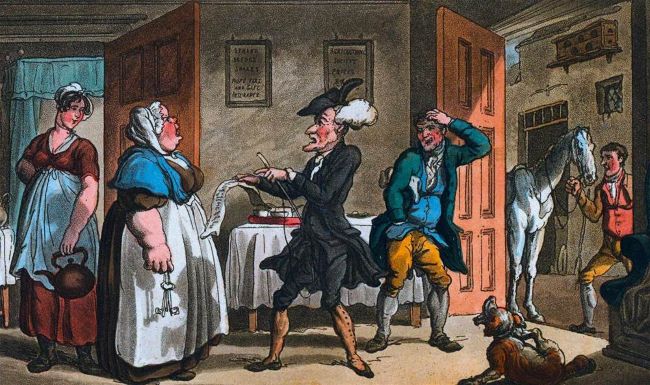Georgian lodgers
Lodging with Mozart(and Shelley, Franklin and Byron)
It may seem strange in our home-owning obsessed times, but thousands of Georgians – from modest milliners to world-famous poets – chose renting a room over gaining a toehold on the property ladder. Gillian Williamson explains why

Penny pinchers A lodger disputes his bill with his landlady in this 1812 print by Thomas Rowlandson. Many Georgians preferred to rent single rooms, rather than lease or purchase whole properties themselves
GETTY IMAGES/YALE
June 1785 in London was uncomfortably hot, relieved on the evening of Thursday 16th by a light breeze. Where Compton and Greek Streets met in Soho, shopkeepers were closing for the day, with residents propping open their windows and making ready for the night.
In the second-floor front room at Mrs Hannah Barker’s house, milliner Mary Gay had tucked her son into bed and was tidying up. She opened the closet door. Suddenly the room filled with flames and smoke. A fire had burned through the wall separating the Barker residence from the neighbour: Mr Glossop, a successful candle-maker. Panicking, Mary grabbed her child and raised the alarm. Two more women appeared on the landing: unemployed servant Mary Harivin and a clergyman’s daughter. Without time to gather belongings, they raced downstairs, alerting Gilbert Dring, the tailor on the first floor. Mrs Barker unbolted the front door. With her three stepchildren, sister and housemaid, they all ran into the street joining other residents who were fleeing flames fanned by the wind and sucked into open windows.
There followed a night-long battle to save people, homes and possessions. Surgeon Andrew Nihell had the narrowest escape, dragged with ropes from the rubble of a collapsed house. Dawn brought a sorry sight: 15 houses had been destroyed, and more damaged by smoke. The charitable response was immediate, raising £1,281 4s (more than £200,000 today). By 1 July, the first payments were being made to victims.
Outnumbered by lodgers These payments reveal something about Compton and Greek Streets that we might not anticipate but which would have been expected at the time. These ordinary terraced houses – three storeys with two rooms to a floor, a basement and garret, in a respectable part of town – were not just family homes and businesses. They accommodated scores of lodgers renting rooms in someone else’s house, for cash, usually paid weekly.
Of 85 claimants in the aftermath of the blaze, 16 were householders (the main occupants of the properties with leases from the freeholder, the Portland Estate). Twenty-nine were their personal or business servants. However, householders and servants were outnumbered by 40 lodger claimants, representing at least 65 individuals across 22 affected houses. They included Mary Gay and her son; Mary Harivin; the clergyman’s daughter; Gilbert Dring; and Andrew Nihell, his wife and child.